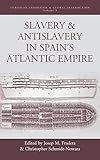Slavery and Antislavery in Spain's Atlantic Empire / ed. by Christopher Schmidt-Nowara, Josep M. Fradera.
Material type: TextSeries: European Expansion & Global Interaction ; 9Publisher: New York ; Oxford : Berghahn Books, [2013]Copyright date: ©2013Description: 1 online resource (340 p.)Content type:
TextSeries: European Expansion & Global Interaction ; 9Publisher: New York ; Oxford : Berghahn Books, [2013]Copyright date: ©2013Description: 1 online resource (340 p.)Content type: - 9780857459336
- 9780857459343
- Antislavery movements -- Caribbean Area -- History
- Antislavery movements -- Latin America -- History
- Slave trade -- Caribbean Area -- History
- Slave trade -- Latin America -- History
- Slavery -- Caribbean Area -- History
- Slavery -- Latin America -- History
- HISTORY / Europe / Spain & Portugal
- Colonial History, History (General)
- 306.36209729 23
- HT1052.5 .S58 2013
- online - DeGruyter
| Item type | Current library | Call number | URL | Status | Notes | Barcode | |
|---|---|---|---|---|---|---|---|
 eBook
eBook
|
Biblioteca "Angelicum" Pont. Univ. S.Tommaso d'Aquino Nuvola online | online - DeGruyter (Browse shelf(Opens below)) | Online access | Not for loan (Accesso limitato) | Accesso per gli utenti autorizzati / Access for authorized users | (dgr)9780857459343 |
Frontmatter -- CONTENTS -- ILLUSTRATIONS -- ACKNOWLEDGMENTS -- INTRODUCTION Colonial Pioneer and Plantation Latecomer -- Chapter 1 – THE SLAVE TRADE IN THE SPANISH EMPIRE (1501–1808) The Shift from Periphery to Center -- Chapter 2 – PORTUGUESE MISSIONARIES AND EARLY MODERN ANTISLAVERY AND PROSLAVERY THOUGHT -- Chapter 3 – THE ECONOMIC ROLE OF SLAVERY IN A NON-SLAVE SOCIETY The River Plate, 1750–1860 -- Chapter 4 – Slaves and the Creation of Legal Rights in Cuba Coartación and Papel -- Chapter 5 – Cuban Slavery and Atlantic Antislavery -- Chapter 6 – WILBERFORCE SPANISHED Joseph Blanco White and Spanish Antislavery, 1808–1814 -- Chapter 7 – Spanish Merchants and the Slave Trade From Legality to Illegality, 1814-1870 -- Chapter 8 – LA AMISTAD Ramón Ferrer in Cuba and the Transatlantic Dimensions of Slaving and Contraband Trade -- Chapter 9 – ANTISLAVERY BEFORE ABOLITIONISM Networks and Motives in Early Liberal Barcelona, 1833–1844 -- Chapter 10 – MOMENTS IN A POSTPONED ABOLITION -- Chapter 11 – FROM EMPIRES OF SLAVERY TO EMPIRES OF ANTISLAVERY -- SELECTED BIBLIOGRAPHY -- CONTRIBUTORS -- Index
restricted access online access with authorization star
http://purl.org/coar/access_right/c_16ec
African slavery was pervasive in Spain’s Atlantic empire yet remained in the margins of the imperial economy until the end of the eighteenth century when the plantation revolution in the Caribbean colonies put the slave traffic and the plantation at the center of colonial exploitation and conflict. The international group of scholars brought together in this volume explain Spain’s role as a colonial pioneer in the Atlantic world and its latecomer status as a slave-trading, plantation-based empire. These contributors map the broad contours and transformations of slave-trafficking, the plantation, and antislavery in the Hispanic Atlantic while also delving into specific topics that include: the institutional and economic foundations of colonial slavery; the law and religion; the influences of the Haitian Revolution and British abolitionism; antislavery and proslavery movements in Spain; race and citizenship; and the business of the illegal slave trade.
Mode of access: Internet via World Wide Web.
In English.
Description based on online resource; title from PDF title page (publisher's Web site, viewed 25. Jun 2024)


